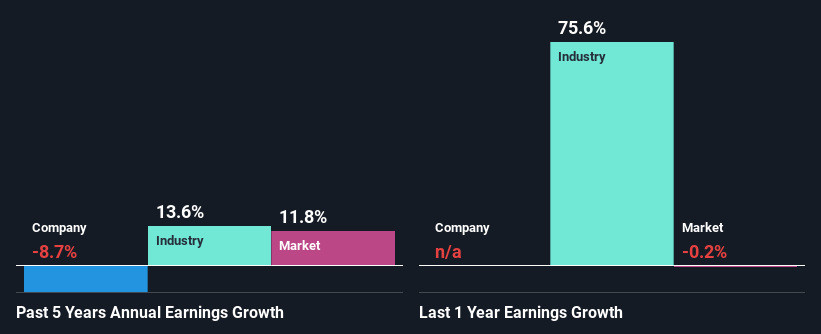Tigerair Taiwan Co., Ltd.'s (TWSE:6757) Stock On An Uptrend: Could Fundamentals Be Driving The Momentum?

Tigerair Taiwan (TWSE:6757) has had a great run on the share market with its stock up by a significant 85% over the last three months. Given that stock prices are usually aligned with a company's financial performance in the long-term, we decided to study its financial indicators more closely to see if they had a hand to play in the recent price move. In this article, we decided to focus on Tigerair Taiwan's ROE.
Return on Equity or ROE is a test of how effectively a company is growing its value and managing investors’ money. In simpler terms, it measures the profitability of a company in relation to shareholder's equity.
See our latest analysis for Tigerair Taiwan
How Is ROE Calculated?
The formula for return on equity is:
Return on Equity = Net Profit (from continuing operations) ÷ Shareholders' Equity
So, based on the above formula, the ROE for Tigerair Taiwan is:
44% = NT$2.3b ÷ NT$5.1b (Based on the trailing twelve months to March 2024).
The 'return' refers to a company's earnings over the last year. That means that for every NT$1 worth of shareholders' equity, the company generated NT$0.44 in profit.
What Is The Relationship Between ROE And Earnings Growth?
So far, we've learned that ROE is a measure of a company's profitability. Based on how much of its profits the company chooses to reinvest or "retain", we are then able to evaluate a company's future ability to generate profits. Generally speaking, other things being equal, firms with a high return on equity and profit retention, have a higher growth rate than firms that don’t share these attributes.
Tigerair Taiwan's Earnings Growth And 44% ROE
Firstly, we acknowledge that Tigerair Taiwan has a significantly high ROE. Additionally, the company's ROE is higher compared to the industry average of 21% which is quite remarkable. Needless to say, we are quite surprised to see that Tigerair Taiwan's net income shrunk at a rate of 8.7% over the past five years. So, there might be some other aspects that could explain this. These include low earnings retention or poor allocation of capital.
That being said, we compared Tigerair Taiwan's performance with the industry and were concerned when we found that while the company has shrunk its earnings, the industry has grown its earnings at a rate of 14% in the same 5-year period.

Earnings growth is an important metric to consider when valuing a stock. What investors need to determine next is if the expected earnings growth, or the lack of it, is already built into the share price. Doing so will help them establish if the stock's future looks promising or ominous. Is Tigerair Taiwan fairly valued compared to other companies? These 3 valuation measures might help you decide.
Is Tigerair Taiwan Efficiently Re-investing Its Profits?
Tigerair Taiwan doesn't pay any regular dividends, meaning that potentially all of its profits are being reinvested in the business, which doesn't explain why the company's earnings have shrunk if it is retaining all of its profits. It looks like there might be some other reasons to explain the lack in that respect. For example, the business could be in decline.
Summary
In total, it does look like Tigerair Taiwan has some positive aspects to its business. However, given the high ROE and high profit retention, we would expect the company to be delivering strong earnings growth, but that isn't the case here. This suggests that there might be some external threat to the business, that's hampering its growth. While we won't completely dismiss the company, what we would do, is try to ascertain how risky the business is to make a more informed decision around the company. You can see the 1 risk we have identified for Tigerair Taiwan by visiting our risks dashboard for free on our platform here.
Valuation is complex, but we're here to simplify it.
Discover if Tigerair Taiwan might be undervalued or overvalued with our detailed analysis, featuring fair value estimates, potential risks, dividends, insider trades, and its financial condition.
Access Free AnalysisHave feedback on this article? Concerned about the content? Get in touch with us directly. Alternatively, email editorial-team (at) simplywallst.com.
This article by Simply Wall St is general in nature. We provide commentary based on historical data and analyst forecasts only using an unbiased methodology and our articles are not intended to be financial advice. It does not constitute a recommendation to buy or sell any stock, and does not take account of your objectives, or your financial situation. We aim to bring you long-term focused analysis driven by fundamental data. Note that our analysis may not factor in the latest price-sensitive company announcements or qualitative material. Simply Wall St has no position in any stocks mentioned.
Have feedback on this article? Concerned about the content? Get in touch with us directly. Alternatively, email editorial-team@simplywallst.com
About TWSE:6757
Flawless balance sheet with proven track record.


